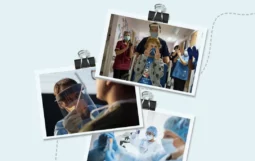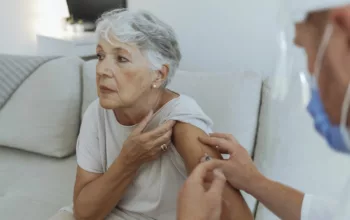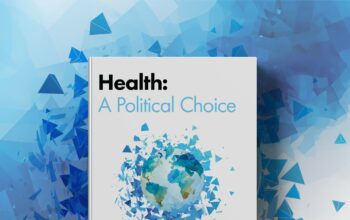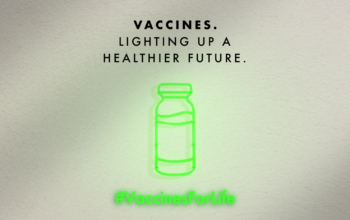Vaccines: Reflecting on 2017 and what’s on the 2018 horizon
Vaccines: Reflecting on 2017 and what’s on the 2018 horizon
2017 has shown how the power of collaboration and partnership is vital in extending the benefits of vaccines to an ever-growing number of people. Let me take you through some of the key moments for vaccines in 2017 and look ahead to 2018.
Immunization is a proven tool for saving lives and improving the health of communities. In 2017, it was important that innovation continued to address unmet medical and programmatic needs, and helped contribute to the WHO’s Global Vaccine Action Plan target of preventing millions of unnecessary deaths by 2020. Advances were made in Ebola, where current vaccine candidates developed by Merck and by NIAID’s Vaccine Research Center in partnership with GSK were shown to provide at least yearlong protection[i]. Harvard Medical School and Janssen presented clinical data on a new HIV vaccine concept, which demonstrated 66% protection against the virus in rhesus monkeys[ii].
We welcomed the launch of the Coalition for Epidemic Preparedness Innovations (CEPI) in Davos, a global effort to accelerate R&D of vaccines for emerging infectious diseases, which enables public-private partnership between key stakeholders. Save the Children, WHO, UNICEF, and Médecins Sans Frontières collaboratively launched the ‘Humanitarian Mechanism’, which will help to provide affordable and timely access to vaccines in the face of humanitarian crises.
In Africa, the 28th African Union Summit saw leaders endorse the Addis Declaration on Immunization of February 2016 to ensure a healthier future for all of the people on the African continent.
The WHO elected Dr. Tedros Adhanom Ghebreyesus as Director-General. Dr. Tedros previously led negotiations on the Addis Ababa Action Agenda in which 193 countries financially committed to achieving the Sustainable Development Goals (SDGs), and is a former Gavi Board member.
What does 2018 have in store for vaccines?
2018 commemorates the 100th anniversary of the ‘Spanish’ flu pandemic, which killed as many as 100 million people, and acts as a reminder of how devastating a pandemic can be. Today, vaccination is an integral component of many countries’ preparedness plans. Influenza vaccines are more readily available and offer a baseline level of protection should another pandemic threat emerge. The vaccine community has come a long way over the last 100 years and will continue to overcome challenges in 2018.
Typhoid fever remains a serious public health concern in Gavi countries. Vaccination at an early age is key to controlling the disease, which is becoming increasingly resistant to antibiotics. Following WHO’s Strategic Advisory Group of Experts (SAGE) recommendations and a new Gavi-funding window of $85 million, Gavi will invite requests for support from eligible countries to introduce the first prequalified conjugate vaccine for typhoid from 2019. Five additional typhoid conjugate vaccines are expected to be launched between now and 2022. Children in the poorest countries can have hope of being protected against typhoid fever in the future.
Gavi will finalize its new vaccine investment strategy (2021-2025), featuring some of the latest scientific discoveries of the research-based manufacturers that have the potential to make a meaningful socio-economic and public health impact in Gavi countries.
In 2018, the Interagency Expert Group (IAEG) for the SDGs should provide more clarity on how countries will report on the strength of their immunization system, based on SAGE recommendations to track immunization coverage with a life-course approach, including six vaccines. Of course, immunization is relevant well beyond extending lives, directly contributing to 14 of the 17 SDGs, being a cornerstone of integrated primary health care and central to the global movement toward universal health coverage.
Development of a malaria vaccine will progress as Ghana, Kenya and Malawi participate in a WHO pilot for the RTS, S/AS01 malaria vaccine. The vaccine, known as Mosquirix, is developed by GSK and the PATH Malaria Vaccine Initiative and has been positively reviewed by the EMA. It shows how continued investment in R&D can produce groundbreaking prevention tools, which will complement the existing package of malaria prevention measures.
2018 should see continuing collaboration to ensure that immunization is fully aligned and integrated with global health and development agendas. ‘s In IFPMA’s 50th year, we will continue to place vaccine innovation at the heart of the biopharmaceutical industry’s contribution to health, and ensure that patients gain access to life-saving prevention and treatment interventions by supporting the goals of universal health coverage and by strengthening regulation.
[i] https://www.sciencedaily.com/releases/2017/10/171011180601.htm
[ii] http://cvvr.hms.harvard.edu/blog/https/wwwvoxcom/science-and-health/2017/7/24/16019590/hiv-vaccine-international-aids-society-conference
Author






